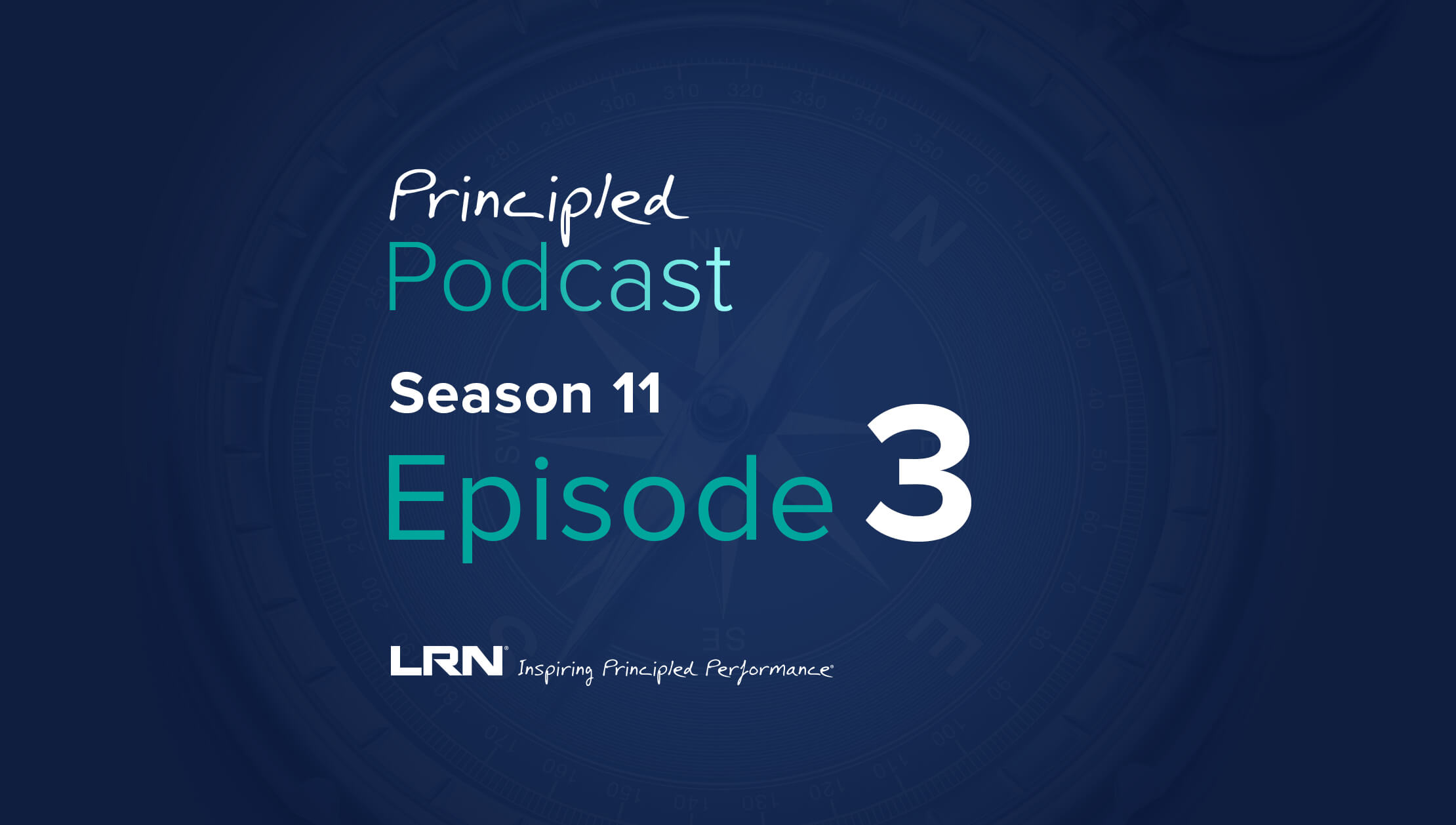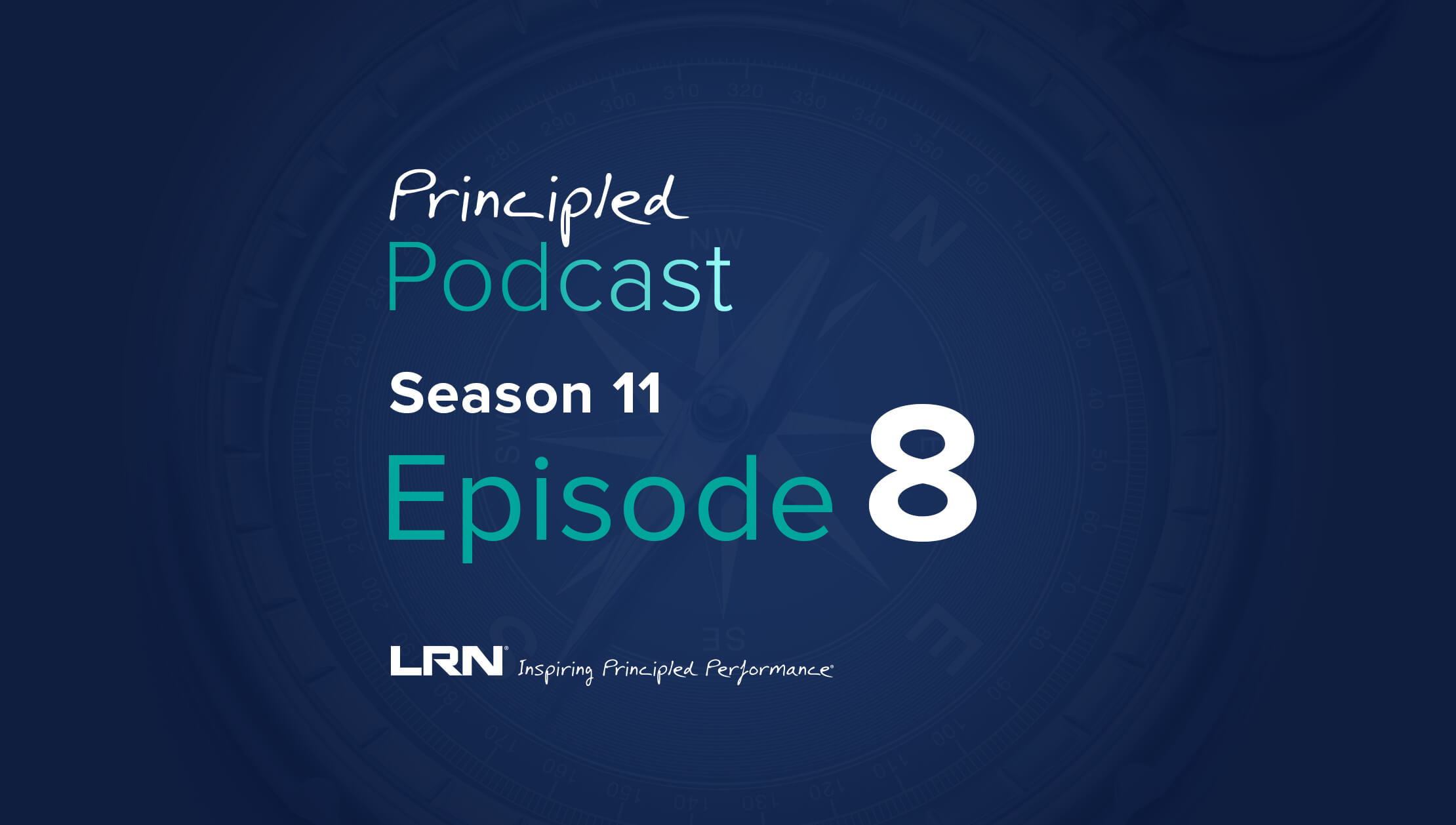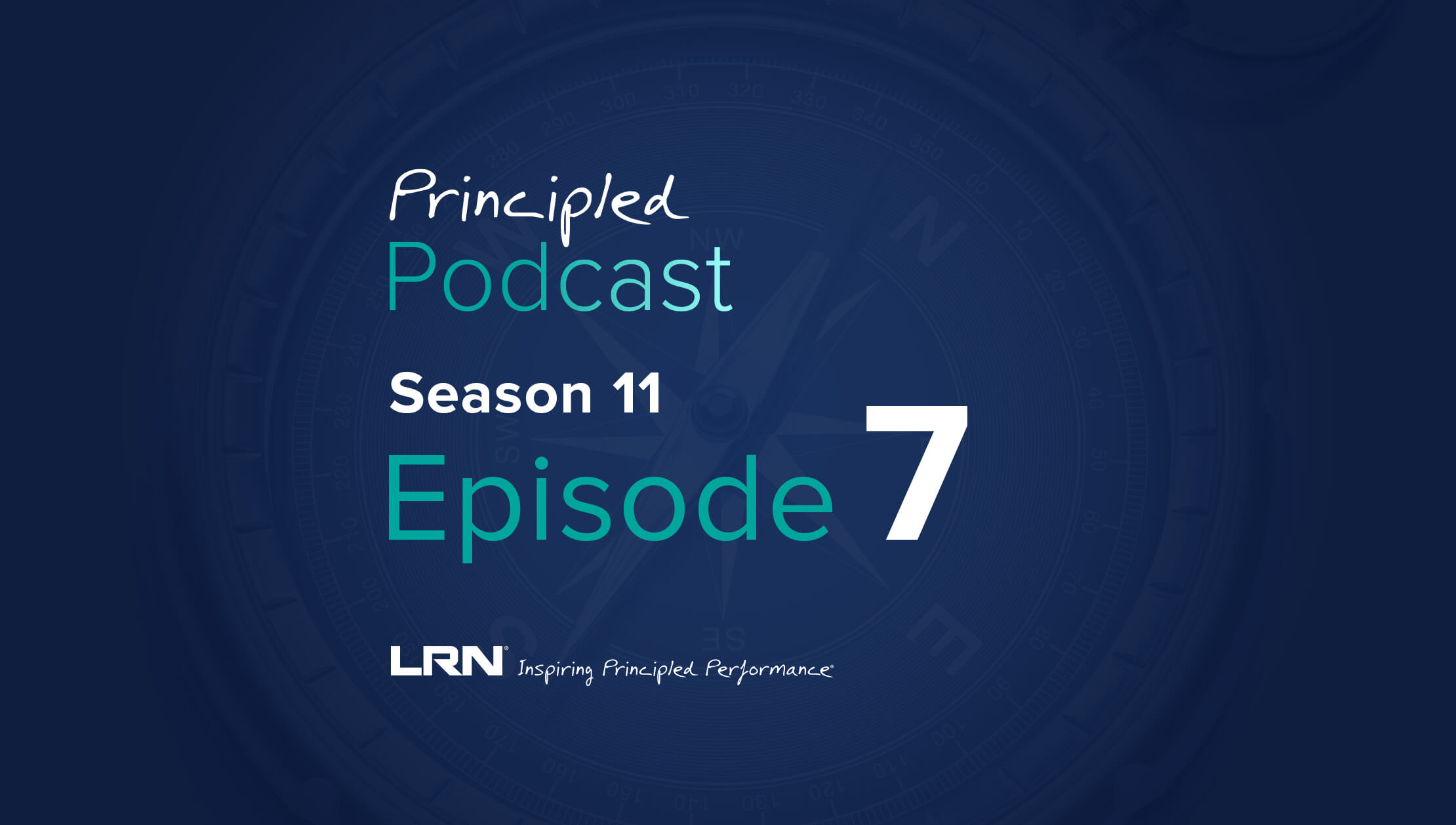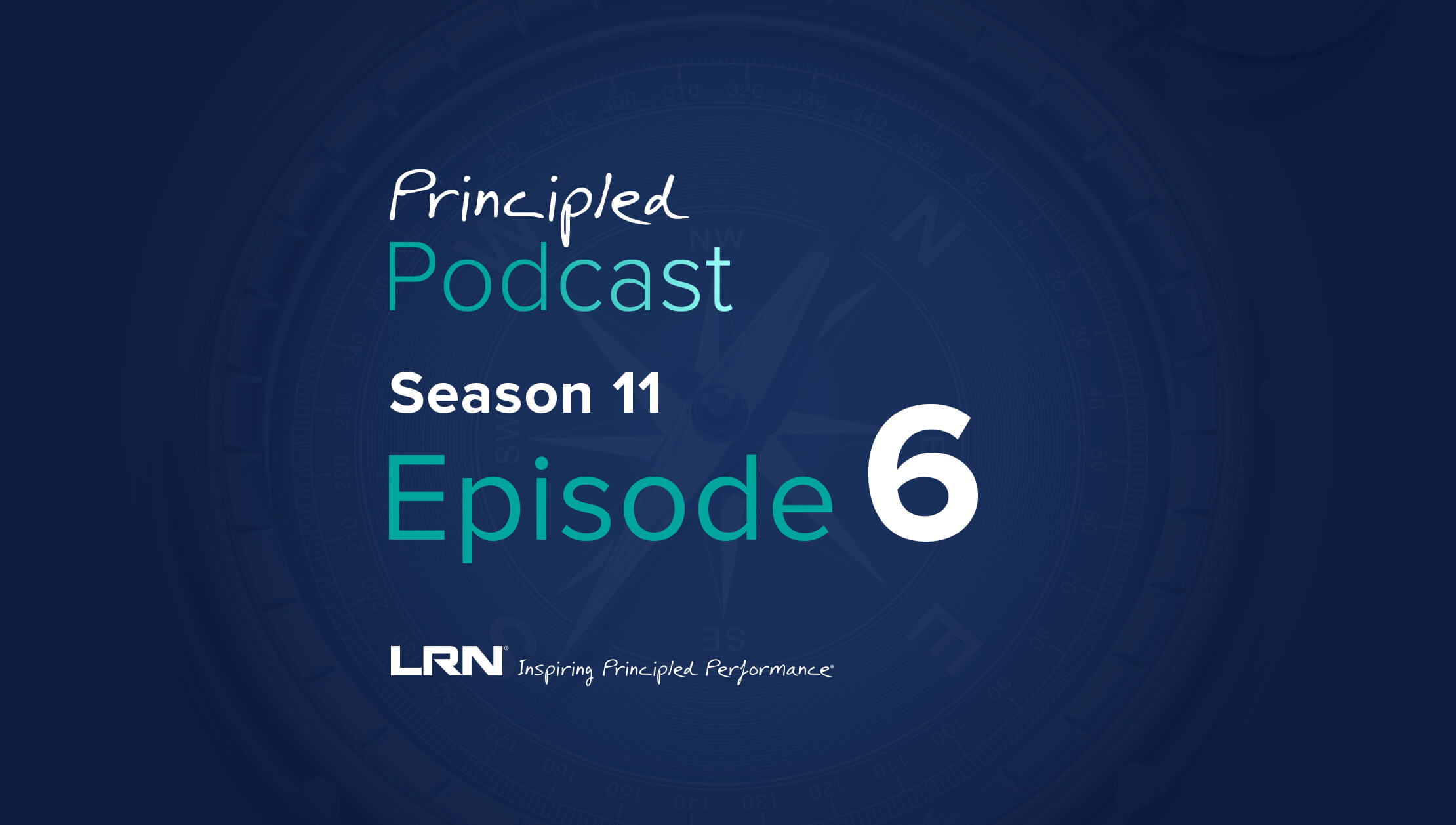What you'll learn on this podcast episode
In this episode of the Principled Podcast, host Frances Ibekwe, LRN's Senior E&C Advisor and Barrister, is joined by Gaby Gray, Head of Legal at Alliance Pharma, to explore insights from LRN's 2024 Ethics & Compliance Program Effectiveness Report, with a focus on the UK region. As organizations worldwide face escalating risks, the report underscores the pivotal role of values-based E&C programs in mitigating these challenges. Drawing from global data and insights from over 1,400 E&C professionals, they discuss the effectiveness of such programs in risk reduction and driving positive business outcomes. Tune in as they delve into the evolving landscape of E&C programs in the UK, examining practical best practices for implementation and offering valuable insights for navigating ethical challenges and achieving compliance excellence both locally and globally.
Get a copy of the UK edition of LRN’s 2024 Ethics & Compliance Program Effectiveness Report.
Where to stream
Be sure to subscribe to the Principled Podcast wherever you get your podcasts.
Guest: Gaby Gray
Gaby Gray is Head of Legal for Alliance Pharma, a global consumer healthcare company. Starting her legal career in private practice at a UK magic circle firm, Gaby has work in industry for 18 years as an in-house lawyer at FTSE 100 and 250 global corporates. Her interests include yoga, books, British country houses and Greek mythology
Host: Frances Ibekwe

Frances Ibekwe is a barrister and Senior Ethics & Compliance Advisor at LRN. She is a subject-matter expert in advising, managing, monitoring, and training on ethics, compliance, risk, and legal matters. Frances helps companies implement effective ethics and compliance programs through our Advisory services such as evaluating programs, reinventing/simplifying code of conducts, and training/communication strategies. Before joining LRN, Frances held roles as a litigator, in government practice for the Serious Fraud Office, and as an in-house compliance lawyer for companies including Cushman & Wakefield, Christie’s, and Tik Tok. Frances received her law degree from King’s College London with an Erasmus year spent at KU Leuven, Belgium, her Master’s degree in international law from University College London, and the Bar Vocational Course from City, University of London. She also has an Award in Management and Leadership from the Chartered Management Institute. Her hobbies include sports, dance, and languages.
Principled Podcast transcription
Intro: Welcome to the Principled Podcast, brought to you by LRN. The Principled Podcast brings together the collective wisdom on ethics, business and compliance, transformative stories of leadership, and inspiring workplace culture. Listen in to discover valuable strategies from our community of business leaders and workplace change-makers.
Frances Ibekwe: As new risks increase in severity and frequency around the world, ethics and compliance, that's E&C programs, are focused on their risk mitigation efforts. And this is a key theme of LRN's brand new 2024 Ethics & Compliance Program Effectiveness Report, which features global data and insights from more than 1,400 E&C professionals. According to our research, values-based programs are not only the most effective, but also correlate strongly with reduced risk and better business outcomes. So how are E&C programs and regions like the UK evolving in response to this increasingly complex risk landscape? And what do these global best practices look like for programs in that region on a day-to-day basis?
Hello, and welcome to LRN's Principled Podcast. I'm your host, Frances Ibekwe, senior E&C advisor and barrister at LRN. And today I'm really pleased to say that I'm joined by Gabby Gray, the head of legal at Alliance Pharma. We're going to be discussing key findings from the UK edition of the 2024 Ethics & Compliance Program Effectiveness Report and how they apply to programs in that region. So, Gabby, thank you for joining me on the Principled Podcast. Could you start by telling our listeners a little bit about Alliance Pharma and your role within the organization?
Gabby Gray: Hi, Frances. Thank you so much for having me on your podcast. And hopefully I will have something interesting to say about ethics and compliance and LRN's 2024 Effectiveness Report for your listeners today. So a little bit about me, I am head of legal for Alliance Pharma, a consumer healthcare company. Well, we are headquartered in the UK. Our operations are global with all of the opportunities and challenges that presents for companies, particularly from an ethics and compliance perspective. At Alliance, we sell a mix of pharmaceuticals and over the counter consumer health products. Our portfolio is a collection of trusted brands with sort of proven clinical efficacy. We have two strategic focus areas that have helping damage skin and supporting healthy aging. And these reflect not just corporate goals, but a genuine concern for the wellbeing of our consumers.
So I really love my job as head of legal. And as much as that probably comes across as a bit of a platitude, I genuinely relish the breadth of my role. I have an incredibly supportive boss, our general counsel, and a really competent legal team who keep me honest. So as head of legal, obviously, my role spans contracts, regulations and everything in between, but I also wear the hat of our ethics and compliance. And for me, a commitment to ethical conduct and a dedication to upholding the values that define alliance are really an important part of my role. Our CEO has said to me that the legal team is the conscience and moral center of the company, and that's a responsibility I embrace proudly.
Frances Ibekwe: I think that's a great segue into this question that I want to explore with you, Gabby. We talk about conscience and moral sense of the company, and I want to link that with a fundamental principle of E&C programs is that values are the principal motivator of ethical behavior. Now, this idea has actually gained significant traction over time. And according to our global data sets, it was actually quite a key figure whereby 77% of E&C professionals say that their organization emphasizes values rather than rules to motivate ethical behavior. And that's actually a 27 percentage point increase from when LRN first asked this type of question in 2016. So I just wanted to explore your thoughts on that.
Gabby Gray: So I can only really speak from a UK perspective as my 20-year career has really been solely based at UK headquartered global corporates. But I can certainly say that over the course of my career, I've seen the evolution of ethics and compliance programs from what was sort of originally called corporate social responsibility programs back in the 90s to sustainability programs in the 2010s, now to environmental, social and governance programs, but all of which ultimately sought to address how companies should best discharge their ethical responsibilities to the communities they operate in, to their customers, and to their stakeholders, and now increasingly corporate accountability to and for our planet.
So I absolutely agree that there is a growing recognition that these early ethics and compliance programs perhaps had an over-reliance on policy procedures and rules that may not have reflected the realities on the ground for employees and in some cases were impossible to comply with leading to kind of a disconnect between stated principles and actual behavior. I had certain compliance investigations that happened in China, and you would see that in China, there is just a different cultural milieu, and it's a lot harder for employees to speak up against leaders in their business because it's such a hierarchical culture. And often there's such a focus on familial and friendship bonds that that can come into conflict with duty to the company. And I think it was just really important coming from a Western perspective to really understand that in order to create a more values-based compliance program than something that's simply focused on rules.
Frances Ibekwe: So really kind of moving across, I guess, from that tick list, kind of checkbox.
Gabby Gray: It has to work on the ground and it has to work in a global context if that's what you're operating in as a company. So what I would say is at Alliance, well, policies and procedures absolutely still do form the bedrock of our E&C program. So if you want me to elaborate on that, I think I would argue that a values-led compliance program really involves the following factor. Number one, setting the appropriate tone from the top. And everyone talks about this, but what does that mean? I think targeted ethics and compliance training to the board on the current ethics and compliance landscape is crucial. I think strong executive comms to the business ideally in engaging formats like videos that really champion and support ethical behavior.
Frances Ibekwe: So not just your standard emails. So making it interactive and engaging, which is another thing we found in the reports.
Gabby Gray: Absolutely. So training compliance companies like LRN are introducing such things as having an intro video from your CEO as part of the compliance training program. And I think that that really lands well with employees. I think also having a board-level ethics and compliance committee that has explicit responsibility for oversight of E&C, which is then supported by the people who are actually managing day-to-day operations in the business, thereby sort of also setting the appropriate tone from the middle.
Frances Ibekwe: Yeah.
Gabby Gray: And then finally, ideally, and I think this is on the horizon for a lot of companies and some companies have achieved it, executive performance incentives tied to measurable E&C targets.
Frances Ibekwe: Definitely. I was just going to say on that point, we actually found that with high-performing programs, they actually did better in those areas because they had an active board of directors and they also ensured personal accountability for misconduct.
Gabby Gray: Exactly. And so other things that are kind of crucial, so number two, regular compliance audits that identify compliance risks and gaps that are specific to your company. I do think employee and partner codes of conduct that focus on values over rule of following are really important and that set out expected behaviors and include such things as ethical decision-making trees to really help people sort of come to the right decision. And then crucially, easy access to speak up helpline that enables employees and the general public to raise ethical concerns anonymously without fear of detrimental treatment. I think that's really important.
I'm speaking to an LRN podcast, and so I definitely think gamified annual compliance training that creates awareness and keeps people's attention without being patronizing, ideally with the training cadence that kind of conflicts with financial quarters year-ends so that people actually have capacity to take the training is really important. And then I think that also there needs to be enhanced by bespoke training for teams on certain specific areas of compliance. So for example, delivering workshop-based modern slavery, red flag training to the employees who conduct supplier site visits, for example.
And then I think finally, and this is probably a drum I'm going to beat throughout our chat, Frances, is, and this is sort of most importantly for Global Corporates, a values-led E&C program that's designed for the global workforce that is culturally sensitive to and appropriate for all offices and locations of operation. So this involves really simple things such as ensuring your policies and training are available in your core languages, not just in English, and are not completely UK or US-centric, that you're considering the cultural norms and business practices in each country of operation. And you're taking this into account when you're either implementing your E&C program or conducting compliance investigations and I think in order to ensure that a values-led approach will resonate with the entire workforce.
Frances Ibekwe: Definitely, agree with those points. I think we're both smiling as you are speaking and I'm listening, and I would definitely tap into that point where you've spoken about interactive, for example. And I know we've spoken previously and you were talking about your compliance program. And it's actually quite welcoming to find that you are meandering into that area of high-performing UK programs. And we found in the reports, for example, that high-performing UK programs are really leading the way in several areas. For example, we found that they were 1.4 times more likely to strengthen their codes of conduct using interactive data, and that can include interactive, but also the number of clicks in the code and topics that employees choose. And also they were 1.8 times more likely than less effective programs to provide employees with continuous learning.
So that goes to your point about having gamified training, but also different types of training to engage with particular employees based on their needs. So that really is music to my ears because that really does link to the findings in our reports. And I just wanted to hone in a bit more in terms of... There are so many feral insights from the 2024 report, and I just wanted to explore those too. And based on the UK edition of this report, I just wondered if there are any other findings that most resonated with you.
Gabby Gray: So I totally agree that data protection is a key area of focus for global corporates as so many countries are bringing in data protection legislation that may either have extraterritorial reach or that may catch you if you have employees or collect data in that jurisdiction. So for example, Alliance Pharma has an office in Shanghai, and so we spend a lot of 2023 getting compliant with the people, which is the personal information protection law in China in time for the December compliance deadline. And we've also had to grapple with how to best manage data protection as a global company. So for example, do we take a jurisdiction specific approach and have multiple policies, which can be quite tricky to manage or do we take a harmonized global approach to data protection that is sort of broadly compliant that may miss important local nuances? So in our case, we've sort of ended up on primarily following kind of an EU GDPR approach in most jurisdictions with specific enhancements for local law where necessary, but it was a conversation and definitely a hot topic last year.
Another hot topic and increased risk identified in the report is the influx of ESG related legislation that's being brought in by different governments around the world, often with very little notice. It can be really tricky to keep on top of all of this legislation when you're operating in hundreds of countries. And I know that a few UK companies, for example, almost got cut out last year by the UK's new plastic packaging tax-
Frances Ibekwe: Yep.
Gabby Gray: ...that makes UK companies liable to pay tax on non-recyclable packaging that is used in their supply chain used by their suppliers. So we were one of those companies that had to respond to this. And luckily, we've put in place an appropriate compliance program, but it has also served to galvanize asset Alliance to sort of increase the overall environmental sustainability of our packaging. And so these laws are serving to drive the right behaviors.
And then finally, I've already touched on this, but I'm sort of really passionate about the topic of UK corporate scaling their E&C programs, probably.
Frances Ibekwe: Yeah.
Gabby Gray: You'll be able to tell from my accent that I'm not from the UK, I am from the former British colony of Canada.
Frances Ibekwe: Yep.
Gabby Gray: And so I do have the unique perspective of being an immigrant to the weird and wonderful British culture. So I do believe that if UK companies are going to thrive in a global landscape, they really do need to take the time to understand and respect the really very different cultures, languages, and sort of social mores of the countries in which they operate. So this can often be as simple as ensuring that different accents and nationalities are represented in compliance training modules that I've already covered, or that training is delivered in local language or that compliance officers take the time to understand the specific ethical challenges faced in regional offices, which can really vary across the world.
Frances Ibekwe: Definitely agreed. And that's another link to one of the findings on our reports. We did find that UK ethics and compliance programs, they are really trying to scale their operations globally and they are doing so and they're using different methods to do that, whether it's regional committees and ethics ambassadors in local regions in addition to appointing compliance officers on the grounds in countries in which they have major operations. But one of the interesting points on that was that we didn't actually find that to be a key indicator for high performing programs, which led us to perhaps consider that it's not necessarily which methods that UK E&C programs are using to scale their operations globally, it's more about the quality of those methods and their impacts. So again, I hear you when you talk about are they really considering local nuances, whether it's just things such as accents and ways to really get in touch with local requirements.
Gabby Gray: And the other thing I would say, Frances, on that as well is I feel like maybe 20 years ago, there was kind of like you took a compliance program off a bookshelf and rolled it out. And I think there's a recognition now that a risk-based approach and a tailored approach for your company, you don't need to boil the ocean-
Frances Ibekwe: Yep.
Gabby Gray: You just need to target and mitigate and understand the specific risks for your company.
Frances Ibekwe: Definitely agreed on that. That takes us neatly into, it's not about boiling the ocean, as we said. And just kind of on that theme, on that tone, unfortunately not every insight from the report is a positive one, and there are areas that need significant improvement. For example, we found that the gap between leadership and middle management when it comes to putting E&C into practice really continues to grow. So for example, in the UK, there's actually a 29% difference between executives and senior leaders on one hand and middle managers on the other hand in terms of taking into account company values to make difficult decisions. And that's actually the highest gap since LRN started collecting data on that point. And I just wondered if that surprised you at all, and if there are some ways you'd recommend that E&C leaders in the UK can address this?
Gabby Gray: I'm not surprised by this finding. I think this is really an enduring issue in global E&C programs because the executives who set the targets are not the operational managers delivering the results, and there can sometimes be a reality check needed between senior leadership's expectations and the art of the possible. Equally, there are also the UK companies, admittedly fewer and fewer these days, at least that's the glass half full version of Gabby speaking, where there are executives who pay lip service to ethics, but don't provide middle managers with the resources or tools to deliver effective compliance programs. I do have a lot of empathy for leadership teams who are being squeezed in the current environment to both, "You've got to deliver that shareholder value," while also delivering E&C targets that often increase operational costs. It can be a really bitter pill to swallow and really hard to deliver.
So I think the best way to address this potential disconnect is to, as I said previously, have a board level E&C committee with overall oversight and responsibility and accountability for ethics and compliance in the business with an operational sort of subcommittee that delivers the E&C program on a day-to-day basis.
Frances Ibekwe: Yeah.
Gabby Gray: I think you also need to have at least, and this is, I think, a finding from the report as well, at least one dedicated individual, obviously ideally a team-
Frances Ibekwe: Yep.
Gabby Gray: ... who has core responsibility for ethics and compliance-
Frances Ibekwe: Yes.
Gabby Gray: ... who can help project manage and provide pace and focus to the compliance work streams. Because I've heard a lot of great ideas and blue-sky thinking that remain just that unless you have somebody who's actually dedicated to delivering them in practice.
Frances Ibekwe: Definitely agreed. And that definitely does link to the reports. When we look at high impact programs, for example, and I was referring before to quality in terms of how those programs were implemented, they definitely have that edge in terms of quality resources, and that was a distinguishing feature. For example, high-performing programs. They were nearly 1.5 times more likely than less effective programs to have around five to 10 dedicated ethics and compliance professionals. So that was quite a key finding. So thank you for your thoughts on that point. And it's great to see that many of the findings actually resonate with the work that you do and with the industry that you are in. And I just wonder how is your organization planning to address some of these trends in 2024?
Gabby Gray: So in 2024, we're really going to focus on honing our risk-based approach to compliance. And this is going to be through initiatives such as conducting a targeted and focused gaps analysis of our modern slavery compliance in our supply chain with a support of Slave-Free Alliance. I'm just going to give them a little plug because Slave-Free Alliance are a fantastic, not-for-profit organization-
Frances Ibekwe: Yep.
Gabby Gray: ... and they effectively operate as a critical friend to corporates and organizations sort of supporting them to protect their operations, supply chains, and people from modern slavery and labor exploitation. So they've been really helpful in helping us hone our anti-slavery program.
Frances Ibekwe: Okay.
Gabby Gray: Also, in 2023, we established a board-level ESG committee. So that's covering human rights and ethics and compliance. And so 2024 is going to be its first full year of operation. So this year, at the ESG committee, we're going to be focusing primarily on diversity, equity, and inclusion initiatives-
Frances Ibekwe: Okay.
Gabby Gray: ... improving the environmental sustainability of our packaging as I already mentioned, and also looking to mature our human rights strategy.
Frances Ibekwe: That sounds great. I just kind of think about things particularly for ESG on the UK horizon where we've been more and more subjected to ESG regulation. You've got the FCA's new sustainability disclosure requirements, and there are also those proposed diversity, equity, and inclusion rules to boost DEI in financial services. So those are great points, and it's great to hear that all of that is on your radar in terms of those focus areas. I just wanted to move on and just consider, are there any other points that you want to highlight when you look at the UK findings or to emphasize?
Gabby Gray: So one of the findings that really resonated with me is the finding that ethical culture matters and underpins successful performance across an organization, not just in ethics and compliance. And so I would agree that it's definitely my experience that it's not just sort of top-down, [inaudible 00:23:45], or rules-based policy that determines the success of a business, but it's a genuine no-blame culture based on trust and value. So I would wholly agree with that. I think it's especially important for companies that are seeking to recruit the generation that's currently entering the workforce because Gen Z, they genuinely expect their employer to align with their moral centre and to live their values at work.
Frances Ibekwe: Definitely agree with that. It's questions that people have when they go in for job interviews, it's questions that you can see that come across in code of conducts that we prepare, where those values companies really want to get that across. And again, that goes back to that initial point that we started off with when we spoke about values over rules. It's not just a checklist, it's about implementing the values-based approach.
And with that in mind, I just wanted to move on to talk about the fact that 2024 marks the 10th annual publication of LRN's Ethics & Compliance Program Effectiveness Report. And we've covered quite a few areas where programs can improve their effectiveness and strengthen core components, risk mitigation efforts, focusing on values, and really put into practice E&C at all levels, and also incentivize an ethical conduct. And that's what we've looked at over the last 10 years. And so I just really wanted to tap into what you are thinking in terms of what sorts of developments do you hope to see E&C tackle over the next year or even the next 10 years.
Gabby Gray: So I know that we are now four years out from the pandemic, but I really feel like there's been a paradigm shift when it comes to flexible and remote working. So in the next year, I think that ethics and compliance leaders are going to need to tackle employee wellbeing and look at implementing such things as like employee engagement charters that kind of firmly enshrine policies around flexible and hybrid working so that employees clearly know where they stand, recognizing that people should have autonomy and responsibility to manage their career whilst fulfilling their deliverables and meeting expectations of stakeholders. I know that there are certain corporate leaders who have come out with really contrary opinions, but it just feels like there's been a permanent shift to flexible working, and I believe compliance programs need to recognize and address this as a human rights issue.
Frances Ibekwe: Well, we did actually find, Gabby, with our findings that generally with UK ethics compliance programs, there has been that shift to make significant changes to the program to meet the needs of employees working remotely on a hybrid basis. For the UK, we found about 72% of programs have done that, and that kind of aligned with the 72% at the European level, just a little bit lower than the global level of 74%. So hopefully, we're going in the right direction.
Gabby Gray: And it just opens doors and is game-changing for women, for carers, for parents, for people living with disabilities, for people who live not in cities. It has really increased access to employment. So I do think it is a human rights issue of our time.
Frances Ibekwe: Yeah.
Gabby Gray: So you also asked me about the next 10 years.
Frances Ibekwe: Yes.
Gabby Gray: I'm going to make a very obvious point here, but I don't think we can ignore the impact of the environment on ethics and compliance programs.
Frances Ibekwe: Yeah.
Gabby Gray: So climate change is the existential crisis of our time. I really believe that companies are going to need to fundamentally adapt the capitalist model that has basically been gospel since the industrial revolution. This is one that justifies increasing shareholder value at the complete expense of the environment. Over the next decade, ethics and compliance programs, I think, will need to play a key role in evolving corporate strategies around environmental compliance and sustainability.
Frances Ibekwe: Definitely agreed. I mean, we have the regulation there. And kind of going back to that value-based model, it's really about making it a centre, isn't it? We've got regulations, one just thinks about, yes, we're in the UK, but there's still a European Corporate Sustainability Reporting Directive which does require UK organizations with at least one subsidiary or branch in the EU and exceeding a certain threshold to provide sustainability reporting. So they definitely agreed on those points, Gabby.
I think we could speak all day in terms of the findings from this report. There's so much food for thought, but I really want to thank you for sharing your insights from this report. It's really been great having you on the podcast. I hope you'll come back and speak with us again soon. I've got-
Gabby Gray: Thank you, Frances. It's always a pleasure to speak with you. And I'm really grateful to have the chance to give my thoughts and insights on your report.
Frances Ibekwe: Thank you so much, Gabby. Well, everyone, my name is Frances Ibekwe, and I want to thank you all for tuning into the Principal Podcast by LRN.
Outro: We hope you enjoyed this episode. The Principled Podcast is brought to you by LRN. At LRN, our mission is to inspire principled performance in global organizations by helping them foster winning ethical cultures rooted in sustainable values. Please visit us at lrn.com to learn more. And if you enjoyed this episode, subscribe to our podcast on Apple Podcasts, Stitcher, Google Podcasts, or wherever you listen. And don't forget to leave us a review.
Be sure to subscribe to the Principled Podcast wherever you get your podcasts.















